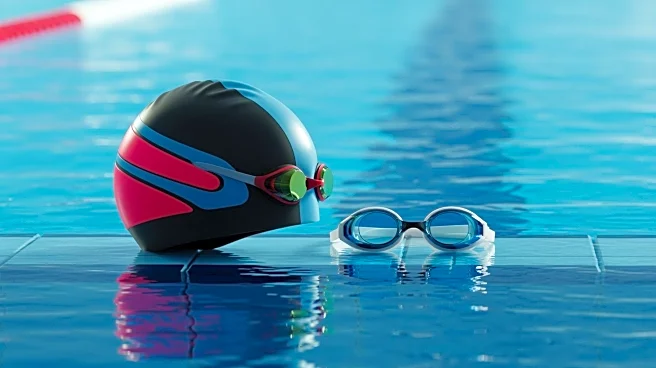What's Happening?
Australian swimmer Kaylee McKeown has set new world records during the second leg of the Swimming World Cup held in Westmont, Illinois. McKeown, known for her prowess in backstroke events, competed against
her long-time rival Regan Smith in the 200m backstroke final. Both swimmers surpassed the previous world record, but McKeown emerged victorious with a time of 1:57.87, earning her a gold medal. This achievement comes as part of Australia's transition into the post-Ariarne Titmus era, following Titmus's recent retirement announcement. McKeown's performance was complemented by fellow Australian swimmer Mollie O'Callaghan, who also set a world record in the 200m freestyle, clocking in at 1:49.77.
Why It's Important?
McKeown's record-breaking performance highlights her continued dominance in the swimming world, particularly in backstroke events. Her achievements contribute to Australia's strong presence in international swimming competitions, especially as the nation adapts to the absence of Ariarne Titmus, a four-time Olympic champion. The new records set by McKeown and O'Callaghan not only reinforce Australia's competitive edge but also inspire upcoming swimmers in the country. The financial rewards accompanying these records, including bonus cheques, further incentivize athletes to strive for excellence in their respective disciplines.
What's Next?
Following these record-breaking performances, McKeown and O'Callaghan are expected to continue their competitive streak in upcoming international events. Their success at the World Cup may influence their preparation strategies and boost their confidence as they aim for further achievements. The swimming community will likely keep a close watch on their progress, especially as they represent Australia in future competitions. Additionally, the retirement of Ariarne Titmus may open opportunities for other swimmers to step into the spotlight and redefine Australia's swimming legacy.
Beyond the Headlines
The retirement of Ariarne Titmus marks a significant shift in the Australian swimming landscape, potentially altering team dynamics and leadership roles. McKeown's success amidst this transition underscores the resilience and adaptability of Australian swimmers. Her achievements also highlight the importance of mental and physical preparation in overcoming challenges and setting new benchmarks in the sport. As McKeown continues to excel, her journey may serve as a motivational narrative for athletes facing personal and professional hurdles.











